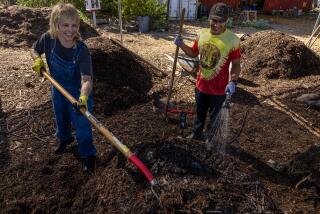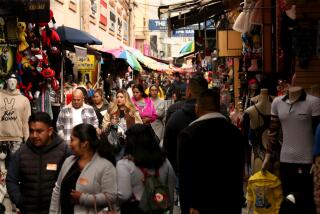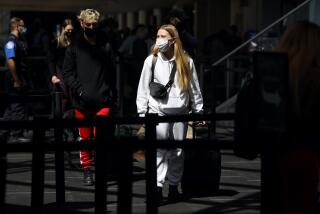‘These people are warriors.’ Meet the waste workers taking risks to sort your recyclables
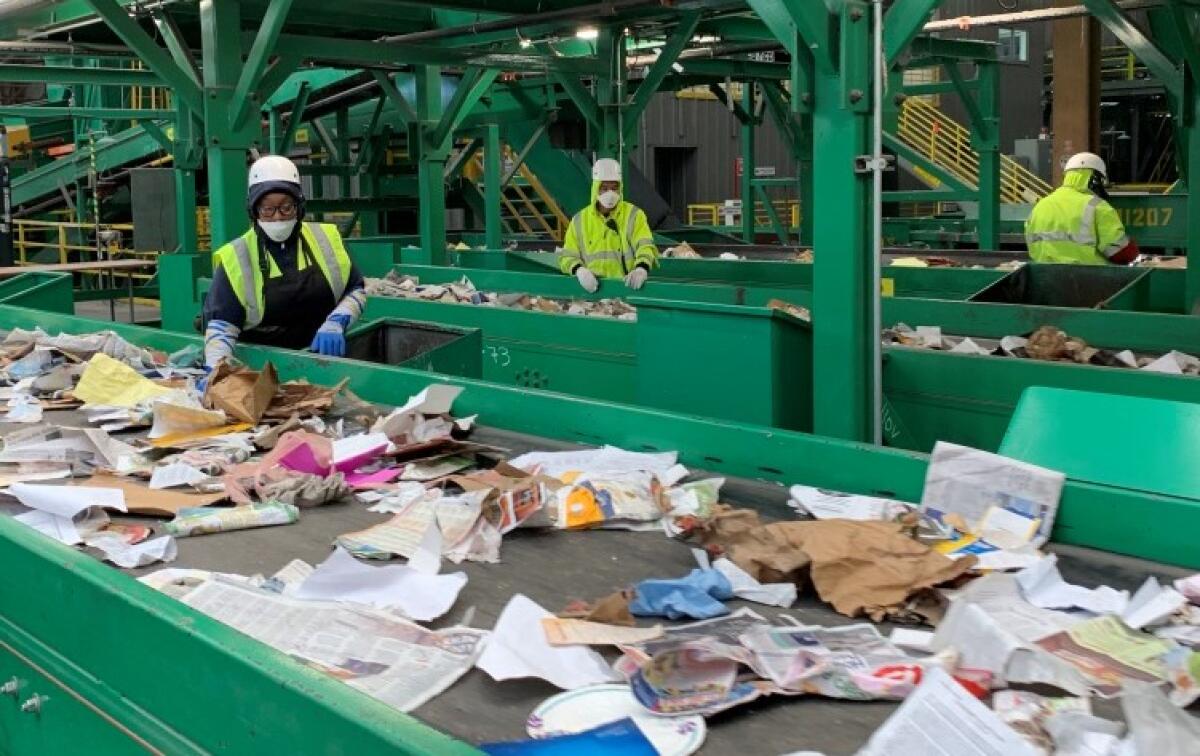
- Share via
SAN FRANCISCO — On Friday morning, Noel Tucker — gloved, masked, and dressed in an apron and hard hat — attacked the refuse stream rolling by her on a fast-moving conveyor belt, pulling out plastic bags and loose plastic films, and tossing them into a metal bin by her side.
She’s a sorter at San Francisco’s Recology recycling center. And while most of the city’s residents are hunkered down in their homes, keeping clear of the coronavirus that has infected more than 1 million people worldwide, thousands of waste sorters, haulers, mechanics and engineers are getting up every morning and leaving their homes — putting themselves at risk to keep California’s towns and cities clean.
“These people are warriors,” said Robert Reed, Recology’s spokesman, as he showed a reporter around the bustling plant — a site of determined activity in a city that largely feels and appears abandoned.
Turner’s job, hazardous during normal times — according to the Bureau of Labor Statistics, it is the nation’s fifth-most-dangerous occupation — now carries a new level of risk.
Studies show the coronavirus can live on cardboard, cloth, plastic and metal surfaces for hours and, in some cases, days. That means Turner and her colleagues are potentially being exposed to live virus as they collect and sort trash from infected households.
Recology is taking precautions to keep its workers healthy, said Reed.
Seven vending machines near the entrance to the recycling plant hold protective gear, such as glasses, masks and gloves. Employees enter a code, and a spiral dispenser pushes the item forward and drops it down, where workers, such as Ben Carter, who demonstrated for a visitor, can retrieve it.
Carter said he preferred vending machines with food but was happy to have the gear he needed to keep protected as he and colleagues process the 650 tons of waste San Franciscans send his way, every day.
And though the company is 100% operational in terms of residential hauling services (it has closed a buy back center, closed in-person payment centers, and reduced hours at a transfer station), Recology has staggered shifts and spaced workers to reduce exposure, Reed said. The company’s employees earn more than $20 an hour, he said.
But what’s happening in San Francisco isn’t necessarily the norm.
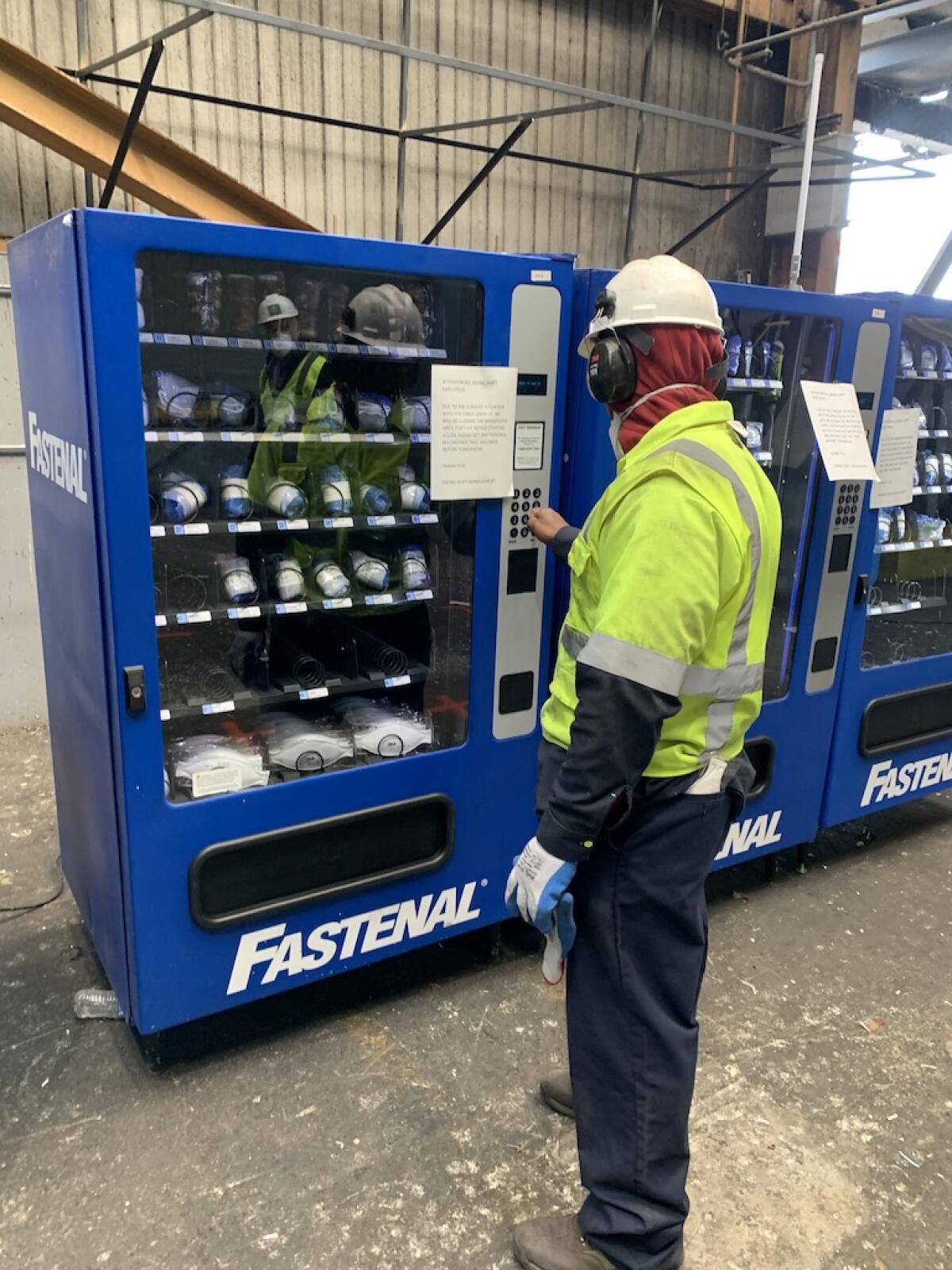
In Los Angeles, city and county officials said that some residential recycling facilities had shut down temporarily to prevent workers from getting sick, leaving waste haulers no choice but to take everything directly to landfills.
Garbage collection, solid waste removal and sanitation services are exempted from the city and county of Los Angeles’ “Safer at Home” orders that have banned events and gatherings and closed nonessential businesses, but only if they can comply with social distancing requirements.
This has meant that some facilities have had to suspend operations, said Coby Skye, assistant deputy director for the L.A. County’s Department of Public Works, in a statement Thursday.
“Therefore, the county is allowing some contracted waste haulers that service the county unincorporated areas to dispose of recyclables and green/organic waste at landfills temporarily, if recycling facilities are unable to process the material,” Skye said. “This is done on a case-by-case basis and reviewed weekly.”
Skye said the department was working with the county’s 88 cities, which are responsible for their own trash and recycling collection, to coordinate a “consistent approach” in order “to reduce confusion by the public.”
Several facilities that process recyclables from the city of Los Angeles also have temporarily closed “as a precautionary measure to protect employees from possible exposure to the virus,” according to a statement from the city’s sanitation bureau.
Chuck Stiles, director of the Teamsters’ Solid Waste and Recycling Division, said that worker protection was his biggest concern.
“Many Americans will transition to telework to avoid exposure, including many of your corporate employees,” Stiles wrote in a letter to the largest recycling and waste management corporations in the country. “Our members, however, won’t have that option.”
He pointed to sites in New York and Atlanta, where workers are already becoming sick. He sent photos of leaky hauling trucks dribbling waste into neighborhood streets and drains, as well as unsafe work sites littered with surgical gowns and even ventilator tubes.
“Our people should be protected,” he said. “They’re at the front lines.”
Reed, of Recology, said residents could help reduce worker risk by:
- collapsing cardboard boxes;
- flattening soda cans;
- scrunching plastic items.
Minimizing the volume of trash not only provides more space in a bin, but also saves haulers from having to leave the truck, and streamlines the sorting process in recycling centers.
For Tucker and her colleague, Ayanna Banks, who has been with the company for 20 years, their work is essential in times of crisis.
“We are doing our part to keep families safe and healthy,” said Banks before heading back to her spot at the conveyor belt, ready to remove unwanted debris from the river of recyclable items flowing past her.
More to Read
Sign up for Essential California
The most important California stories and recommendations in your inbox every morning.
You may occasionally receive promotional content from the Los Angeles Times.
